Trialists
First presentations of major trials results

Mayu Balachandran
Dr Balachandran obtained his medical degree from Monash University in 2020 and is now an intensive care registrar at Monash Medical Centre and The Victorian Heart Hospital in Melbourne, Australia. He is currently completing a Master of Medical Statistics at the University of Oxford.
Mayu started ALBICS-AKI trial, as his honours project in 2019 under the supervision of Prof Shehabi. His research interests include haemodynamic support after cardiac surgery and modern statistical models.
Outside the clinical environment Mayu is passionate about education, striving to impart knowledge and skills through evidence. In his spare time, Mayu is an avid landscape photographer.
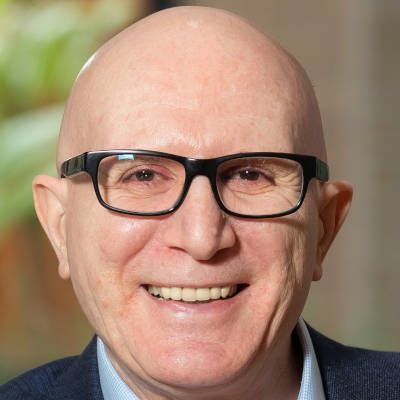
Yahya Shehabi
Dr Shehabi is a Professor of Intensive Care Medicine and Anaesthesia at Monash University and University of New South Wales. Dr Shehabi is a senior clinical academic and an experienced clinical trialist with extensive track record in leading multinational large scale RCTs.
He is the lead architect of the Sedation Practice in Intensive Care Evaluation (SPICE) research programme, culminated with SPICE III and the ongoing SPICE IV trials. Through his research and publications, Professor Shehabi is an acknowledged international authority on sedation and delirium management. His research interests include biomarker of kidney injury and nephroprotection after cardiac surgery.
Twitter: @yahya_shehabi

Shane English
Shane English is an Associate Professor at the University of Ottawa, Department of Medicine (Critical Care) and an Intensivist in the Department of Critical Care at the Ottawa Hospital and the Medical Director of the Intensive Care Unit – Civic Campus. He completed residencies in General Internal Medicine and Adult Critical Care. He holds a Master's degree in Clinical Epidemiology. Dr. English has a particular clinical and research interest in NeuroCritical Care, having completed an additional fellowship at Cambridge in the UK. He is a Senior Scientist at the Ottawa Hospital Research Institute. He is a previous recipient of a National New Investigator Award from the Heart and Stroke Foundation. Dr English's research program is in aneurysmal subarachnoid hemorrhage. He is the international lead of the SAHaRA RCT, a multi-centre international trial examining the effect of different red blood cell transfusion strategies on neurologic functional outcome, in collaboration with the Canadian Critical Care Trials Group.
Twitter: @shane_w_english

Anthony Delaney
Anthony Delaney is a father of three and husband to a multi-talented anaesthetist. He is a Fellow of the Australasian College for Emergency Medicine and the College of Intensive Care Medicine. He is currently a Professorial Fellow in the Division of Critical Care at the George Institute for Global Health, also holding appointments as Associate Professor at Sydney Medical School, University of Sydney and an adjunct Associate Professor at the Australian and New Zealand Intensive Care Research Centre, in the Department of Epidemiology and Preventative Health at Monash University. He maintains a clinical role as Senior Staff Specialist in the Malcolm Fisher Department of Intensive Care Medicine at The Royal North Shore Hospital.
Associate Professor Delaney’s major research interests are centred on improving methods of resuscitation of patients with sepsis and septic shock and improving outcomes for patients suffering acute severe brain injuries.
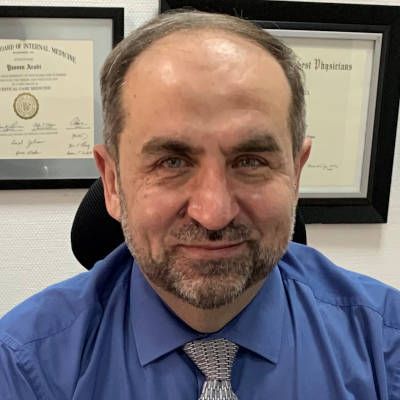
Yaseen Arabi
Dr. Arabi is recognized leader in critical care research and in the area of randomized controlled trial sepsis, mechanical ventilation, Coronavirus disease (COVID-19), and Middle East respiratory syndrome coronavirus (MERs CoV) research. He has led multiple randomized controlled trials that were published in the leading medical journals. He has conducted the PREVENT trial (“Prophylaxis of Thromboembolism in Critically Ill Patients Using Combined Intermittent Pneumatic Compression and Pharmacologic Prophylaxis versus Pharmacologic Prophylaxis Alone: A Multicenter Randomized Controlled Trial”), MIRACLE trial (“MERS-CoV Infection Treated with a Combination of Lopinavir/Ritonavir and Interferon Beta 1B: A Placebo-Controlled, Double-Blind Randomized”) PERMIT trial (The Impact of Permissive Underfeeding versus Target Enteral Feeding on Mortality and Morbidity in Adult Critically Ill Patients: a Multicenter Randomized Controlled Trial”), all published in the New England Journal of Medicine (NJEM). He is the PI of the SCREEN trial (The Stepped-wedge Cluster Randomized Trial of Electronic Early Notification of Sepsis in Hospitalized Ward Patients). He collaborated with the Australian and New Zealand Intensive Care Society (ANZICS), and the Canadian Critical Care Trials Group (CCCTG) on multiple major controlled trials.
He has published over 600 peer-reviewed papers and been recognised in multiple awards. He is currently the chair of the Saudi Critical Care Trials Group (SCCTG).
Twitter: @YaseenarabiYa

Jacob Steinmetz
Jacob Steinmetz, M.D., Ph.D., is a professor in prehospital emergency medicine and a consultant in anaesthesiology in Copenhagen, Denmark. He is currently working as a clinical anaesthetist, prehospital emergency physician and part time researcher. He has published more than 100 papers mainly within trauma, prehospital emergency medicine, and postoperative cognitive dysfunction. He is chief investigator, and sponsor of the TRAUMOX2 trial.
Twitter: @jacob_steinmetz
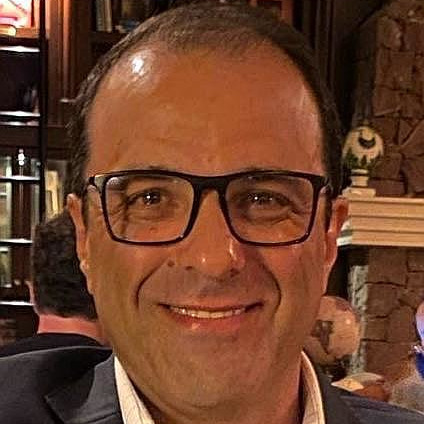
Israel Maia
Dr. Israel Silva Maia is a pulmonologist, intensivist, clinical researcher at the HCor Research Institute in São Paulo, Brazil. He holds a Master's degree in Clinical Trials from the London School of Hygiene and Tropical Medicine and a Ph.D. in Sciences from the Anesthesiology, Surgical Sciences, and Perioperative Medicine program at the University of São Paulo. Currently, Israel serves as a Professor of Emergency Medicine and Intensive Care at the Federal University of Santa Catarina in Florianópolis, Brazil and he is the Scientific Director of the Brazilian Research Network in Intensive Care (BricNet).
Israel's primary academic interests lie in large-scale pragmatic clinical trials and adaptive methodologies. Among his most notable research endeavors are trials focused on acute respiratory failure. These include the REVOLUTION trial, a multi-arm, multi-stage randomized clinical trial investigating repurposed drugs for COVID-19 treatment, published in Lancet Regional Health. Additionally, the STAMINA trial explores driving pressure-limiting strategies for patients with ARDS, and the RENOVATE trial, which compares high-flow nasal oxygen (HFNO) to non-invasive ventilation (NIV) across a broad spectrum of acute respiratory failure causes, is yet to be published.
Twitter: @israelmaia16

Manu Shankar-Hari
Prof Manu Shankar-Hari is Chair of Translational Critical Care Medicine at the University of Edinburgh, Scotland.
Manu offers an unusual combination of translational research skills, allied to formal research training in basic science (PhD in Immunology), and in health services research (MSc in Epidemiology). Manu’s core hypothesis is that modifiable biological networks generate clinical phenotypes of critical illness, and such networks could be determined by integration of clinical and immunobiology data.
Manu’s research group’s two focussed research themes of immunobiology and epidemiology converge on core aims to (i) enable precision immunomodulation in critically ill adults and (ii) generate new molecular reclassification of critical illness into measurable, and treatable immunological abnormalities that are syndrome agnostic (i.e., treatable traits).
For further details please see Manu’s website and the TRAITS Programme website.

Paul Dark
Paul is Professor of Critical Care, NIHR Senior Investigator and Vice Dean for Health and Care Partnerships in the Faculty of Biology, Medicine and Health at The University of Manchester, UK.
He was appointed to his current clinical academic post at The University of Manchester in 2003, developing clinical services and academic practice in Critical Care Medicine at the Northern Care Alliance NHS Foundation Trust (Salford Care Organisation). He developed and provides leadership for a programme of work, funded mainly by the National Institute of Health and Care Research (NIHR), investigating the clinical and cost effectiveness of emerging molecular diagnostic technologies in the setting of sterile tissue injury and severe infections (sepsis) within both high and low resource healthcare settings internationally. Funded by NIHR Manchester BRC, NIHR Manchester HealthTech Research Centre in Emergency and Acute Care and Innovate UK in partnership with industry, he also co-leads an ongoing programme of work developing novel technologies aimed at rapid point-of-care infection/sepsis theragnosis with the aim of optimising patient exposure to antimicrobial drugs.
Paul was NIHR Clinical Research Network's National Deputy Medical Director from 2022 to 2024.. He provided strategic leadership for the development, delivery and accessibility of a large portfolio of national clinical research in NHS acute hospital settings and he represents NIHR internationally. As a former NIHR National Specialty Lead for Critical Care, he served on NIHR's Urgent Public Health Research Advisory Group, providing expert advice on research priority for the Department of Health and Social Care and UK's Chief Medical Officers during the COVID-19 pandemic. In addition, he is Research Professor at the Humanitarian and Conflict Response Institute, providing strategic interdisciplinary leadership in global health and social justice.
Twitter: @DarkNatter

Mark Dennis
Associate Prof Mark Dennis is a cardiologist and mechanical circulatory support lead for cardiology, Royal Prince Alfred Hospital. A/Prof Dennis is chief investigator on >$9 million of funding for research into cardiac arrest and acute cardiac failure. He is a National Heart Foundation Future Leader Fellow for his work into appropriate patient selection, prognostication and access to acute heart failure and cardiac arrest therapies.
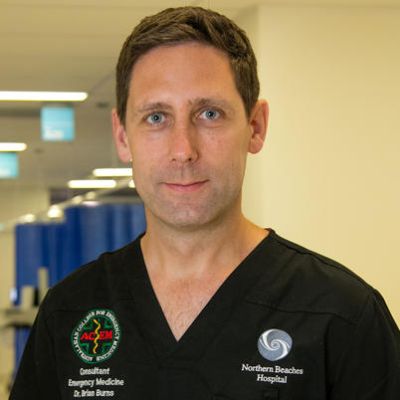
Brian Burns
Brian Burns is an emergency physician at Northern Beaches Hospital, Sydney and a prehospital and retrieval medicine specialist with Aeromedical Operations, NSW Ambulance. He works as a trauma consultant at Royal North Shore Hospital, Sydney, and a Clinical Professor at Sydney Medical School, University of Sydney, as well as a Clinical Professor in the Faculty of Medicine and Health Sciences, Macquarie University, Sydney. He is an active researcher in the areas of trauma and resuscitation.
Twitter: @HawkmoonHEMS
Editorialists & Panelists

Tomoko Fujii
Professor Tomoko Fujii is an intensive care specialist and the Director of Jikei University Hospital ICU in Tokyo, Japan, and an adjunct senior research fellow at the Australian and New Zealand Intensive Care Research Centre, Monash University, Melbourne, Australia. She was an investigator of the VITAMINS trial (JAMA 2020) and is currently taking a leading role of ongoing multiple clinical trials, including the LIMIT trial of low-intensity continuous renal replacement therapy for acute kidney injury. Her research interest areas have included management of sepsis, acute kidney injury, acid-base disorder, and meta-epidemiology. She has been collaborating with investigators internationally through multicentre clinical research projects.
Twitter: @tomoko_ICU
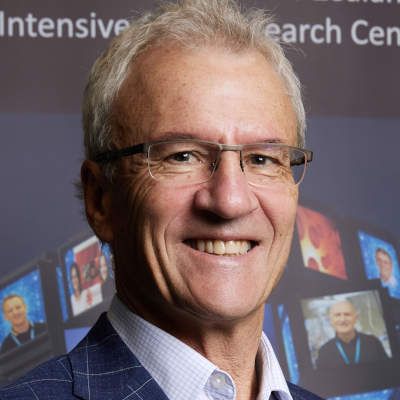
Jamie Cooper
Jamie Cooper is Sir John Monash Distinguished Professor in the School of Public Health and Preventive Medicine (SPHPM) at Monash University, and Senior Specialist in Intensive Care at The Alfred Hospital, Melbourne. In 2017, he was awarded an Officer of the Order of Australia (AO) for distinguished service to intensive care medicine in the field of traumatic brain injury as a clinician, and to medical education as an academic, researcher and author. In 2021, Professors Jamie Cooper and Rinaldo Bellomo were jointly awarded the Research Australia GSK Award for Research Excellence (ARE) in recognition of their global leadership and innovative research in critical care medicine that has helped transform approaches to the treatment of critically ill patients worldwide. The GSK ARE is one of the most prestigious awards available to the Australian medical research community. Prof Cooper is a National Health and Medical Research Council (NHMRC) L3 Leadership Fellow, full Professor of Intensive Care Medicine at Monash University and Hon. Professorial Fellow in the Critical Care and Trauma Division at The George Institute for Global Health, University of Sydney. He has >400 publications including 18 in New England Journal of Medicine (NEJM), The Lancet, and Journal of the American Medical Association (JAMA). He has been a Principal or Co-investigator on peer reviewed research grants exceeding $91M including 45 NHMRC/MRFF grants. Research foci include randomised clinical trials in traumatic brain injury (TBI), sepsis, acute lung injury, resuscitation fluids, and blood transfusion.
He has published three landmark trials including the DECRA trial (CIA NHMRC#314502), which demonstrated unexpectedly inferior long-term outcomes for an increasingly popular neurosurgical intervention (early decompressive craniectomy) that was opposite to apparent short-term benefits, and has initiated international TBI practice review. The trial results were fast tracked for NEJM publication (Cooper DJ, et al. 2011) and were editorialised in the Lancet as “one of the most important clinical trials of a therapy for severe TBI ever conducted”. The trial results have been a watershed in changing current practice and have proved invaluable from both an individual patient and community perspective. This has been incorporated into the international Brain Trauma Foundation practice guidelines. Restricting decompressive craniectomy to selected patients will improve TBI patient outcomes overall and reduce health care spending on lifetime care of severe disability survivors. DECRA was included in Yale University’s 50 most important papers of all time “that shaped the current clinical practice of neurology” and was also included in the “50 of the most important studies in Critical Care Medicine” by Harvard University and Oxford University Press.

Bridget Dicker
Associate Professor Bridget Dicker is a respected academic and practitioner in the field of paramedicine, known for her leadership and dedication to student supervision and her commitment to health equity for Māori communities. She serves as the Clinical Evaluation, Research, and Insights Manager for Hato Hone St John and is a registered Paramedic. Concurrently, she holds a position as an Associate Professor at Auckland University of Technology.
A/Prof Dicker has made significant contributions to out-of-hospital emergency care, particularly in the area of resuscitation. She is the architect and manager of the Aotearoa New Zealand Paramedic Care Collection (ANZPaCC), a pivotal resource established to facilitate research into epidemiological and clinical factors that may enhance patient outcomes. Over the past five years, she has successfully secured more than $1.5 million in competitive research funding and has authored over 50 academic publications.

Kiran Shekar
Kiran Shekar is a Senior Intensive Care Specialist and Director of Research at the Prince Charles Hospital, Brisbane, Queensland, Australia. He holds academic appointments as Professor at University of Queensland, Adjunct Professor at Queensland University of Technology and Associate Professor at Bond University, Gold Coast, Australia.
Shekar is passionate about addressing the global variability in intensive care and extracorporeal life support (ECLS) outcomes through innovation, research, and education. His research interests include pathophysiology of cardiorespiratory failure, ECLS and mechanical circulatory support. His PhD work,” The ECMO PK Project” resulted in an advanced understanding of altered PK/PD on ECMO and provided doing guidance for commonly used antimicrobial and sedative drugs. His ongoing research program “The No Tube Project” aims to integrate less invasive respiratory supports with ECLS to provide more personalized respiratory support and to minimise the burden of invasive mechanical ventilation.
Shekar is an active contributor to the Extracorporeal Life Support Organisation (ELSO) through his research and educational engagements. He is a member of the Asia-Pacific ELSO Education Committee and is the Course Director of an ELSO endorsed ECMO course. He is the research lead for ELSO Education Taskforce (ELSOed) and as a member of the scientific committee of the International ECMO Network, he contributes to global collaborative research in ECMO.

Rachael Parke
Rachael Parke is the Nurse Senior Research Fellow in the Cardiothoracic and Vascular Intensive Care Unit, Auckland City Hospital, New Zealand and Associate Head – Postgraduate Research in the School of Nursing, University of Auckland.
Rachael’s research is embedded in clinical practice and addresses areas of importance to clinicians, patients and families worldwide. She designs novel interventions to improve patient-centred outcomes for cardiothoracic surgical and intensive care patients, including programmes of research into oxygen therapy, acute kidney injury and fluid management.
Rachael has published over 170 articles (h-index Scopus = 41) in high impact journals and received grants exceeding NZ$20 million.
She is passionate about establishing the next generation of clinician researchers and leads two research courses (BASIC Clinical Research and BASIC Research Coordination). She also established a podcast series for nurses, academics and allied health professionals working in ICU or establishing their own academic careers - Critical 2 Your Success.
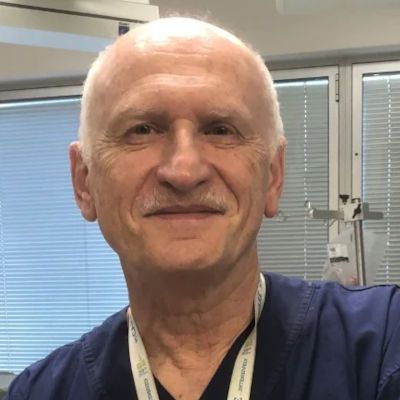
Rinaldo Bellomo
Prof Bellomo is Professor of Intensive Care Medicine, University of Melbourne; Professor of Medicine, Monash University; Co-director of the Australian and New Zealand Intensive Care Research Centre; Director of Intensive Care Research at the Austin Hospital, and Editor-in-Chief, Critical Care & Resuscitation. He has produced >1900 PubMed cited publications, is the most published biomedical investigator in the history of Australian medicine, and the most published intensive care investigator in the world.
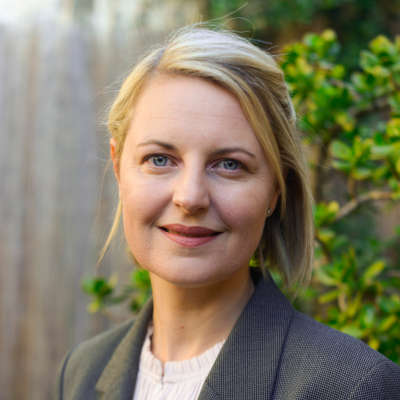
Sarah Sasson
Sarah Sasson is a Clinical Immunologist, Immunopathologist, and Group Leader at The Kirby Institute of Infection and Immunity at The University of New South Wales where she leads wet-laboratory research. She has a growing research program in understanding the immunopathogenesis of sepsis/SIRS in the hope of identifying novel therapeutic targets. Sarah has led translational research projects in T-cell biology, Immune Checkpoint Inhibitor toxicities and COVID-19 vaccination in people who are immunocompromised. Sarah is currently funded by the Australian Medical Research Future Fund, a UNSW Scientia Fellowship, The Australian Intensive Care Foundation, and a USA National Institute of Health R21 Grant.
Twitter: @sarah_sasson

Carol Hodgson
Professor Carol Hodgson is Head of the Division of Clinical Trials and Cohort Studies in the School of Public Health and Preventive Medicine, and Deputy Director of the Australian and New Zealand Intensive Care Research Centre, Monash University, Melbourne, Australia. She has held NHMRC funding throughout her career, as PhD scholarship, Early Career Fellowship and currently with an Investigator Grant (2020-2024). She is a Specialist Physiotherapist in Intensive Care at The Alfred Hospital, Melbourne, Australia. She sits on the Executive and Scientific Committee of the International ECMO Network (ECMONet), the Guidelines Leadership Group for National COVID-19 Clinical Evidence Taskforce and is a Council Member of the International Forum of Acute Care Trialists (InFACT).
Carol leads international multicentre trials for the Australian and New Zealand Intensive Care Society Clinical Trials Group. She has over $20M in grant funding and over 190 publications, with expertise in long-term functional recovery after critical illness. She has contributed to international guidelines for the management of patients with acute respiratory distress syndrome, sepsis and COVID-19, including recommendations for the use of mechanical ventilation, high-flow nasal therapy, oxygen, extracorporeal membrane oxygenation, and early rehabilitation.
Twitter: @chodgsonANZICRC
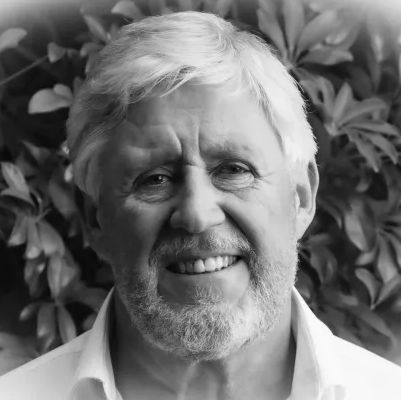
John Myburgh
Professor John A Myburgh AO, is Professor of Intensive Care Medicine, University of New South Wales, Sydney; Director of the Professoriate and Immediate Past-Director of Critical Care Program at the George Institute for Global Health; Senior Intensive Care Physician at the St George Hospital, Sydney He holds a Leadership Fellowship from the National Health and Medical Research Council.
He has worked continuously as an Intensive Care Physician since 1988. He is an internationally recognised clinical researcher and has led the development and co-ordination of over 75 pivotal clinical trials in Intensive Care Medicine.
He has received over A$98M in research grant funding, published over 350 research publications and delivered over 400 presentations at national and international scientific meetings.
He is a Foundation Member and Past-Chairman of the Australian and New Zealand Intensive Care Society Clinical Trials Group, Foundation Member of the Australian and New Zealand Intensive Care Research Centre, Past-President of the College of Intensive Care Medicine and past-Secretary General of World Federation of Societies of Intensive and Critical Care Medicine.
More importantly, he is a dedicated family person, rower, cook and average blues guitar player.

Celia Bradford
Celia Bradford is a Senior Intensive Care Specialist at Royal North Shore Hospital and Director of the Sydney Adventist Hospital ICU. She has an interest in Neurointensive Care and Renal Medicine. Her research has been in these areas. In addition, she is an editor for ‘The Bottom Line’, an online blog that reviews and critiques critical care literature and is interested in converting research findings into clinical practice. She is an advocate for women in Intensive Care and provides mentorship for aspiring Intensivists
Twitter: @celiabradford

Simon Finfer
Simon Finfer is Professorial Fellow in the Critical Care Division at The George Institute for Global Health in Sydney, Adjunct Professor, University of New South Wales and Professor of Critical Care, School of Public Health, Imperial College London.
He leads the Sepsis Research Program at The George Institute which is focussed on the design and conduct of robust high quality RCTs that will reduce death and disability due to sepsis in Australia and around the world.
Simon has obtained over $50M in research funding and authored or co-authored over 250 peer reviewed papers with 20% of those in the highest-ranking medical journals. He served as a guest editor for the New England Journal of Medicine from 2012 to 2014 and is currently an editor of the Oxford Textbook of Critical Care and the Critical Care Section Editor of the Oxford Textbook of Medicine.
Simon was a founding member and is a past-Chair of the Australian and New Zealand Intensive Care Society (ANZICS) Clinical Trials Group, past chair of the International Sepsis Forum, and past Vice President of the Global Sepsis Alliance. He is Director of the Australian Sepsis Network and Asia Pacific Sepsis Alliance.
A Fellow of the Australian Academy of Health and Medical Sciences, Simon was appointed an Officer (AO) in the Order of Australia in the Queen’s Birthday Honours List 2020 for “distinguished service to intensive care medicine, to medical research and education, and to global health institutes”

Sandra Peake
Professor Peake (BM BS, BSc(Hons), PhD, FCICM) is a senior staff specialist and clinician researcher in the Department of Intensive Care Medicine at The Queen Elizabeth Hospital, Adelaide, a Professor in the School of Medicine at the University of Adelaide and an Adjunct Professor in the School of Epidemiology and Preventive Medicine at Monash University, Melbourne. Professor Peake undertook her PhD at the University of Adelaide on immunotherapeutic strategies in septic shock. Her main research interest now is large scale clinical trials to improve patient outcomes for the critically ill. She led the multinational ARISE randomised trial of early goal-directed therapy in early septic shock (NEJM 2014) and the TARGET randomised trial of energy-dense enteral nutrition in mechanically ventilated patients (NEJM 2018). She is currently the chief investigator for the ARISE FLUIDS randomised trial evaluating a restrictive fluid strategy for early septic shock. Professor Peake is the Immediate Past Chair of the Australian and New Zealand Intensive Care Society Clinical Trials Group.
Twitter: @sandrapeake01
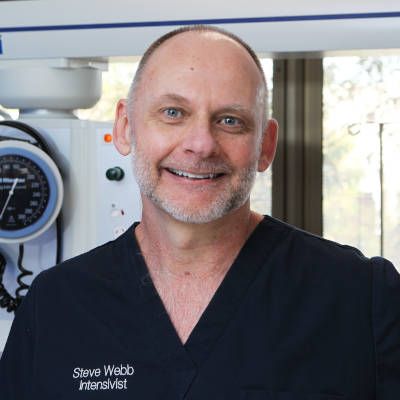
Steve Webb
Dr Steve Webb is an ICU physician and a Professor of Critical Care Research at Monash University. He was a founding director and former Chair of the Australian Clinical Trials Alliance, a past-Chair of the ANZICS Clinical Trials Group and a Foundation Fellow of the Australian Academy of Health and Medical Sciences.
He was a founding investigator and inaugural chair of the REMAP-CAP International Trials Steering Committee and led the platform through the pandemic reporting the treatment effect of multiple different interventions for patients with life-threatening COVID-19 infection.
He has been an investigator on trials with an accumulated sample size of more than 65,000 patients, is a named investigator on more than $160 M of competitive research funding and has published more than 250 manuscripts, including multiple manuscripts in NEJM and JAMA, that have been cited more than 60,000 times.
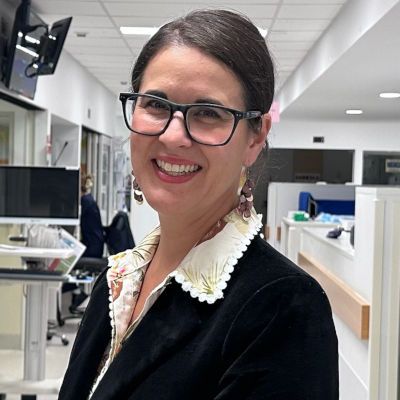
Naomi Hammond
Associate Professor Naomi Hammond, RN, BN, MN (Crit. Care), MPH (with Merit) PhD, is an intensive care nurse researcher. She works part-time as the Critical Care and Sepsis Australia Program Head at The George Institute for Global Health and part-time as the Executive Director, Research for the Northern Sydney Local Health District. Naomi holds several other appointments including NHMRC Emerging Leader Fellow; Conjoint Associate Professor at the Faculty of Medicine, University of New South Wales; Treasurer of the Asia Pacific Sepsis Alliance, and Chair of the Australian Critical Care Nurses Research Advisory Panel.
Naomi’s research interests include fluid resuscitation, sepsis, fever management, knowledge translation and implementation research, health economics, and long-term outcomes post critical illness. Naomi has experience supervising and mentoring medical trainees, nursing staff, higher degree, and medical students in both the clinical and academic environment. Additional to Naomi’s academic portfolio, she has extensive clinical trials operational management experience including finance, regulatory processes, personnel, project, and program management in a clinical and NGO environment.
Twitter: @NaomiHammond
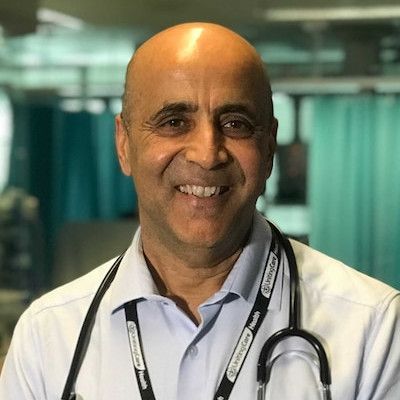
Bala Venkatesh
Bala Venkatesh is Academic Professor of Intensive care at Gold Coast University Hospital, Professor of Intensive Care Medicine at the Universities of Queensland, and. New South Wales, and Program Director at the George Institute for Global Health, Sydney Australia and Adjunct Professor, St John. Medical College Research Institute, Bangalore, India. He leads the task force in the State of Queensland for control of Sepsis.
He has completed Fellowship training in Internal Medicine, Anaesthesia and Intensive Care Medicine. He then undertook a research degree from the University of Birminghan, UK which led to the award of an MD. He pioneered the development of a continuous blood gas monitoring system which reached clinical application.
He served as the President for the College of Intensive Care Medicine of Australia and New Zealand between 2014-2016.
He led the international ADRENAL trial which is largest septic shock trial to date. This was published in the New England Journal of Medicine. He has served on Management and Data Safety monitoring Committees of several randomised controlled trials and as a scientific reviewer for the major journals. During Covid, he was instrumental in setting up many RCTs in India and Nepal through partnerships, leading to development of new therapies.
He has published more than 250 papers, and 40 book chapters, and authored 2 books. He has supervised 8 PhD students.
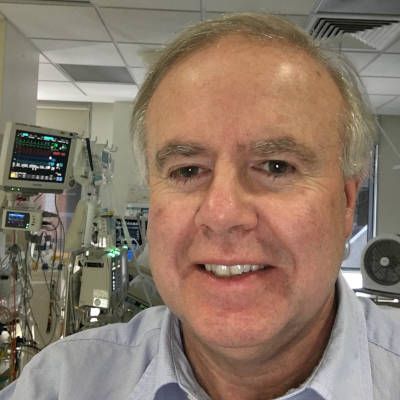
Stephen Bernard
Professor Stephen Bernard is an Intensive Care Specialist at The Alfred Hospital, Director of Intensive Care at Knox Private Hospital and Medical Advisor to Ambulance Victoria. He is an Adjunct Professor in the Department of Epidemiology and Preventive Medicine at Monash University.
He has been a Chief Investigator in numerous clinical trials funded by the Australian National Health and Medical Research Council. In out-of-hospital cardiac arrest patients, the “EXACT” trial tested the reduction of oxygen early after resuscitation, “TAME” tested therapeutic hypercapnia after admission to ICU, and “RINSE” tested pre-hospital therapeutic hypothermia. In trauma patients, “PATCH” tested the role of tranexamic acid in patients with suspected bleeding. In patients with severe TBI, “POLAR” tested early therapeutic hypothermia and the “RSI” trial tested paramedic rapid sequence intubation. The “ICED” trial tested early therapeutic hypothermia in patients with complete spinal cord injury.
Twitter: @AmbVicMedic"

Lisa Higgins
Lisa Higgins leads the Health Economics Program and is a Senior Research Fellow at the Australian and New Zealand Intensive Care Research Centre, Monash University. She is co-Chair of the Australasian Clinical Trials Alliance (ACTA) Health Economics Alongside Trials (HEAT) Group, an honorary Senior Research Fellow at the George Institute for Global Health, a member of the Australian Health Economics Society, Health Services Research Association of Australian and New Zealand, and ANZICS CTG. Lisa has been conducting clinical trials and health economics research in critical care for more than 15 years. Her research focuses on clinical trial methodology, long-term outcomes, and conducting economic evaluations alongside clinical trials in critical care. She has published papers in the area of cost-effectiveness analyses for Australian ICUs and is a leader in her field in this area. She has more than 110 publications with over 11,000 citations and has multiple clinical trial publications in high impact journals including the NEJM and JAMA. Lisa has served as a member of the management committees of 17 large-scale international randomised controlled NHMRC/MRFF trials.
Twitter: @iculisah

Paul Young
Paul Young’s primary research interest is in the design and conduct of large-scale multicentre randomised clinical trials in the field of Intensive Care Medicine. An active member of the Australian and New Zealand Intensive Care Society Clinical Trials Group (ANZICS CTG), Paul is a leading member of the international intensive care research community.
Alongside his role at the MRINZ, Paul is the Medical Director of the Wakefield Hospital ICU and co-clinical leader of the Intensive Care Research Unit at Wellington Hospital. Paul is Clinical Associate Professor, Department of Critical Care, at the University of Melbourne, an Adjunct Professor at the Australian and New Zealand Intensive Care Research Centre, Monash University, and the Associate Editor for Critical Care and Resuscitation, the highest impact journal in the field of Intensive Care Medicine outside the US and Europe.
Involved in research collaborations with colleagues worldwide, Paul has published over 250 peer-reviewed journal articles, including numerous high impact publications in the New England Journal of Medicine, the Lancet, and the Journal of the American Medical Association.
Twitter: @DogICUma

Kathy Rowan
Professor Kathy Rowan is the Director of the NIHR Health and Social Care Delivery Research Programme, former Director of the Intensive Care National Audit & Research Centre (ICNARC), Honorary Professor at the London School of Hygiene & Tropical Medicine and Adjunct Professor (Research) at Monash University, Australia.
In 1994, following her PhD from the University of Oxford, Professor Rowan founded ICNARC, an independent, not-for-profit, scientific organisation to facilitate improvements in the structure, process, outcomes and experiences of critical care - for patients and for those who care for them. ICNARC manages a broad programme of clinical audit and clinical/health services research, nationally and internationally.
Professor Rowan was awarded the Humphry Davy Medal by the UK Royal College of Anaesthetists (2004), completed a Harkness Fellowship (2005), received the President’s Prize with honorary life membership of the UK Intensive Care Society (2019) and Officer of the Most Excellent Order of the British Empire (Queen’s Birthday Honours’ List 2021) for services to research and intensive care.
Twitter: @KathyRowan101
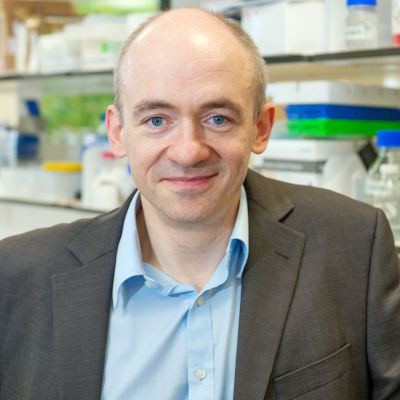
Danny McAuley
Danny McAuley is a Consultant and Professor in Intensive Care Medicine at the Regional Intensive Care Unit at the Royal Victoria Hospital and Queen’s University of Belfast. He undertook his training in Belfast, Birmingham, London and San Francisco. He is Programme Director for the MRC/NIHR Efficacy and Mechanism Evaluation (EME) programme and Co-Director of Research for the UK Intensive Care Society. He has several research interests including Acute Respiratory Distress Syndrome and clinical trials. He is involved in multiple clinical trials, including being an executive team member of the PANTHER trial, a Bayesian adaptive platform randomized clinical trial studying novel interventions to improve outcomes for patients with acute hypoxaemic respiratory failure
Twitter: @dfmcauley
Statisticians

Marion Campbell
Marion Campbell is Vice-Principal (Research) for the University of Aberdeen and Professor of Health Services Research in the Health Services Research Unit (HSRU). Marion is a medical statistician and clinical trialist. Her main research interests are in the design, conduct and analysis of clinical trials, especially complex trial design and the design and conduct of surgical and device trials. She has published widely on clinical trials methodology, including on cluster randomised trials, design of trials of non-pharmacological interventions, pragmatic trials and trials reporting. She has served on many national and international funding agencies and committees and is an elected Fellow of the Royal Society of Edinburgh, the Faculty of Public Health and the International Society for Clinical Trials.
Marion graduated with an honours degree in Statistics from the University of Aberdeen and subsequently gained an MSc in Statistics and PhD in Public Health. Following early career appointments within the National Health Service in the fields of Operational Research and Statistics of Medical Audit, she joined the Health Services Research Unit in 1993. She became Director of the Unit in 2007 - a position she held until the end of 2015, when she became Dean of Research for Life Sciences and Medicine. She took up the role of Vice-Principal (Research) in October 2017. HSRU remains her academic base.
Twitter: @MarionKCampbell

Michael Bailey
Michael Bailey is a Professor in the Department of Epidemiology and Preventive Medicine and the Head Statistician at the ANZ Intensive Care Research Centre (ANZIC-RC) at Monash University. With 28 years of experience as a biostatistician at Monash University, including 17 years with the ANZIC-RC, Prof. Bailey is recognized as the most heavily published intensive care statistician globally and one of the top 10 most published intensive care authors worldwide.
Prof. Bailey is ranked in the top 1% globally for his expertise in “Statistical Models” (0.51%). He boasts an h-index of 114 and has authored over 650 peer-reviewed publications, with more than 180 of those published in the past five years. His rigorous analyses have led to robust findings published in high-impact journals, including 26 articles in the New England Journal of Medicine, The Lancet, and JAMA. His work has been heavily cited, with over 27,000 citations in the past five years and more than 57,000 career citations.

Liz Ryan
Dr Elizabeth (Liz) Ryan is a Biostatistician in the School of Public Health and Preventive Medicine, Monash University. Her PhD was on Bayesian statistical methods for the design of experiments, with applications in clinical trial design. She has ten years’ experience working as a clinical trials statistician in both Australia and the UK, across various health domains. Her current research
interests include innovative clinical trial designs, particularly Bayesian adaptive designs and platform
trials.
Twitter: @whizzfizzlizz

Victoria Cornelius
Victoria Cornelius is a Professor in Medical Statistics and Trial Methodology and Director of Imperial Clinical Trials Unit. Her work in trials includes evaluating drug and complex interventions developing approaches that promote statistical efficiency in both Bayesian and frequentist frameworks. Her statistical methods research is in the use of time-to-event signal detection methods to identify adverse drug reactions, and co-leads the NIHR MRC TMRP specialist research group to improve the analysis of harm outcomes in randomised controlled trials.
Twitter: @VR_Cornelius
Journal Editors

Darren Taichman
Darren Taichman, MD, PhD, MACP is a pulmonary and critical care physician who practices and teaches at the University of Pennsylvania. At Penn, he was Director of the intensive care unit and led research programs focused on critical care medicine and pulmonary vascular disease. Dr. Taichman’s editorial work began in 2007 at the Annals of Internal Medicine, where he was the Executive Editor as well as Vice President of the American College of Physicians, the largest medical specialty organization in the United States. He served as Secretary of the International Committee of Medical Journal Editors from 2014 – 2021. In 2020, Dr. Taichman was appointed Deputy Editor and Online Editor of the New England Journal of Medicine, as well as the Executive Strategy Editor for the NEJM Group. He continues to teach and see patients at the University of Pennsylvania, with a specific focus on the treatment of pulmonary hypertension.

Christopher Seymour
Dr. Seymour is an Associate Professor in the Departments of Critical Care, Emergency Medicine, and Clinical and Translational Science at the University of Pittsburgh School of Medicine. Over the past 10 years, his research program has focused on clinical and translational studies involving sepsis, biomarkers, and large electronic health record databases. Dr. Seymour completed his NIGMS Career Development Award (K23), mentored by Dr. Derek Angus, titled “Prehospital identification of high-risk sepsis.” This successful award led to funding of a NIH/NIGMS R35 ESI-Merit Investigator Research Award, “Sepsis endotypes during emergency care.” He is Director of the Clinical and Translational Science Program in the Department of Critical Care Medicine, member of the International Sepsis Forum (ISF), and Associate Editor for Critical Care at JAMA. His research has been published in the New England Journal of Medicine, JAMA, and The Lancet, among others.



